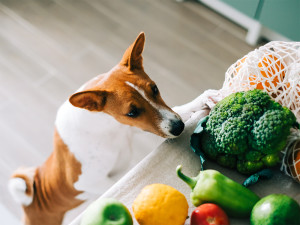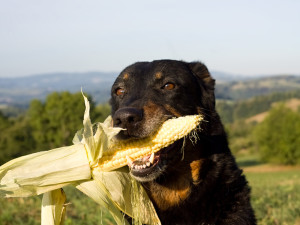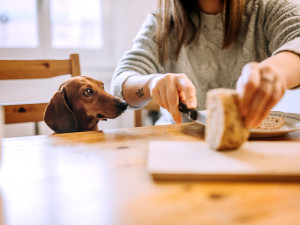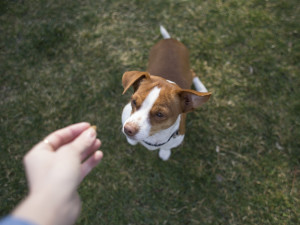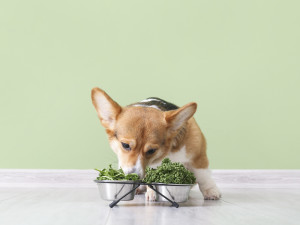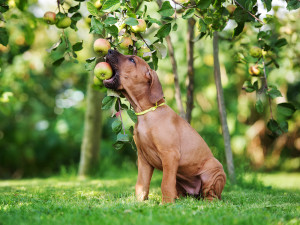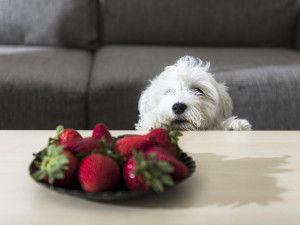Can Dogs Eat Celery?
Sure, they can have a bite—if they want one.
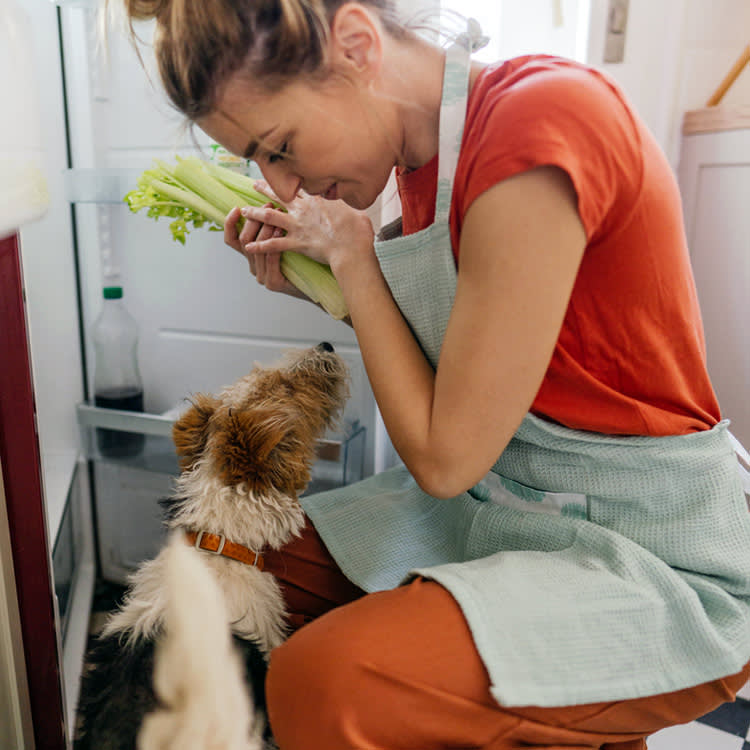
Share Article
Have you ever wondered if your dog would be on team celery or not? Celery is nature’s perfect spoon. Scoop up your favorite dips, nut butters and spreads, and then eat the scooper, too. Celery has many fans, but there are also those detractors out there who resent its stringy texture and tangy taste.
Celery is a safe food to share with your dog in moderation and it can provide fiber and lots of water for hydration. Not every dog will want to partake in a celery snack with you, however, so don’t be offended if your pup turns their nose up at the offer. Read on to learn more about celery and dogs.

littleKin™ is Kinship’s home just for puppy and kitten parents. Bop over to check out expert advice, new pet tools, and special deals—all curated for your newest family member.
opens in a new tabNutrition facts about celery for dogs
Celery has long been touted as a health food due to its low-calorie and high-fiber content. In fact, a cup of celery only has 14 calories and is about 95 percent water. Celery has also been used in certain traditional medicines to treat all kinds of medical conditions, including digestive problems, urinary problems, arthritis, intestinal parasites, and high blood pressure. To date, these health claims have not been thoroughly studied but there are many interesting properties of celery that may have led healers to try it. This includes:
Antioxidants: Celery has natural antioxidants in the form of flavonoids and phenolic compounds. Antioxidants protect cells from oxidative damage and can be beneficial in preventing certain chronic conditions and slowing the aging process.
Antimicrobial properties: Extracts from celery also show antibacterial and antifungal effects against certain pathogens.
Anti-inflammatory effects: Phytochemicals in celery iopens in a new tabncluding luteolin and apiin may also have the ability to prevent and/or reduce inflammation throughout the body.
Is celery good for dogs?
While many of the health claims for celery have intriguing potential, further study is necessary to drill down on precisely how they work and whether they have any effects in dogs. In the meantime, it does reinforce the idea that celery can be a healthy snack for many reasons and your dog can certainly benefit. Here are some of the ways celery can be a good snack for your pup:
High in fiber: Celery is a very high-fiber food. You know this if you have ever spent some time chewing on the stringy fibrous pieces of celery that just don’t feel like they are ever going to surrender to being eaten. Celery has both soluble and insoluble fiber.
These two forms of fiber work in different ways to support digestive health, including providing nutrients to the healthy microbesopens in a new tab of the gut, increasing the bulk of the stool, and preventing constipationopens in a new tab. Fiber also helps create feelings of fullness without adding calories, so it is a good snack for dogs who need to limit their intake as part of a weight- lossopens in a new tab plan.Water content: Celery is about 95 percent water, so it is a very hydrating snack, too. This is especially helpful to pups on hot days when they may need to rehydrate frequently. It also helps to create those feelings of fullness after eating without adding lots of calories.
Vitamins and minerals: Celery is also a source of potassium, calcium, vitamin K, and folate. All of these are essential to your dog’s diet and are found in adequate amounts in commercial dog food as well. Whatever they get from snacks like celery is an added bonus.
Additional health benefits: While still under evaluation, celery may have many additional health benefits to offer including antimicrobial and anti-inflammatory properties.
Can dogs eat all parts of the celery plant?
Yes; the entire celery plant including the leaves, stalks, (and even seeds) is considered non-toxic and safe for dogs to eat. However, there is an essential oil that is made from extracts of the celery seeds, which should be avoided in dogs. This is because essential oilsopens in a new tab can contain other ingredients that are not safe, or the oils themselves can cause irritation of the skin, digestive tract, and/or respiratory tract, depending how they are used.
Is celery completely safe for dogs ?
Yes, celery is safe for dogs as long as it is shared in moderation, and so long as you follow a few basic rules. Like all new foods, it is important to introduce a very small amount at first to make sure your dog tolerates it before giving them a larger portion.
Here are a few warnings to keep in mind when sharing your celery snack with your pup:
Digestive upset: Celery is very high in fiber. While this provides many health benefits, it can also cause some unwanted side effects. Too much fiber can cause digestive upset for dogs including gasopens in a new tab, bloating and diarrheaopens in a new tab. Therefore, keep celery snacks small and start gradually if your dog isn’t used to eating lots of raw fruits or veggies.
Skin irritation: Celery can sometimes cause skin irritation including a rash, blisters, and/or hives in sensitive individuals. This has been documented in humans and livestock, and is extremely rare in dogs.
Lacks critical nutrients: Since celery is mostly water and fiber, it does not provide much energy for dogs. Dogs need to eat a balanced diet to meet their nutritional needs. If they are filling up on snacks like celery, they are missing out on critical nutrients. Be sure to keep celery snacks to a minimum and provide your dog with a complete and balanced dog food.
Choking hazards: Be mindful of how you offer celery to your pup to avoid choking hazardsopens in a new tab. Large pieces of celery are tough to chew and can be a choking hazard if your dog tries to swallow them whole. Try to cut the celery into small bite-sized pieces to help your dog out.
Other toxic ingredients: As always, be sure that you check all the ingredients in a snack you’re sharing with your pup to make sure they are safe and non-toxic to dogs. Even though celery is a safe snack, if it is part of a dish cooked with garlic, onions, or other toxic ingredients, it should not be shared.
For example, ants on a log is a common snack for kids made from celery topped with peanut butter and raisins — make sure if your dog is going to partake, you make a piece with no raisinsopens in a new tab, as these are toxic to dogs.
The bottom line: can dogs eat human food?
Dogs certainly can eat human food, and we all know that most of our pups get at least the occasional taste. This can be perfectly fine, and even healthy, provided you are selective about what foods you share, and how you share them. It is very important for dogs to eat a complete and balanced dog food as their primary diet to ensure they get all of the nutrients they need in the proper balance.
Table scraps and snacks should be minimizedopens in a new tab to less than ten percent of your dog’s total calories to keep this in check. And while there are many foods that are good for sharing, always double checkopens in a new tab that foods you plan to share are safe and nontoxic for dogs. There are a number of common foods and ingredients that are toxic opens in a new taband should never be given to dogs.
Finally, your friendly veterinarian wants to remind you that you can use all of these little treats and table scraps as the perfect opportunities for training and practicing good behavior. So often, behavior problems lead dogs to be relinquished to animal shelters so working with your pup to develop good behaviors is also part of a healthy lifestyle. Any chance you have to reward your dog for good behavior and learning new cuesopens in a new tab is precious. Instead of simply tossing your dog a bite of your snack which may encourage them to beg or jump, ask them to earn it by going to their crate, matopens in a new tab, or designated place. Ask them to sit and wait. Or use it to practice whatever new cues you are working on. Human food is often a high value reward and your dog will be eager to show off their skills in exchange for a taste.
FAQs (People Also Ask)
How much celery can a dog eat?
Celery is safe for dogs in moderation. It should not be more than 10 percent of your dog’s diet. Too much can cause digestive upset since it is high in fiber so start with a small bite-sized amount and see if your dog tolerates it.
Is it OK to give dogs celery?
Yes, celery is a safe food to share with your dog. It is very high in fiber, so offer small amounts to avoid digestive upset.
Why do dogs like celery?
Dogs may like the crunch and juicy texture of celery, but some dogs may be turned off by its smell or tangy flavor.
Can dogs eat celery leaves?
Yes, celery leaves and stalks are safe for dogs to eat so long as they eat small amounts.
Is celery good for dogs?
Celery has lots of water, fiber, vitamins and minerals that are good for dogs. It lacks protein and fat, however, so it should only be used for small snacks.
Is celery seed extract safe for dogs?
Essential oils made from celery seed should not be given to dogs. Different oils can cause irritation of the skin, digestive tract, or lungs depending on how they are used and other ingredients in the preparation may be toxic to dogs.
Other (fruits/veggies/foods) that are good / safe for dogs
Plain, white-meat turkeyopens in a new tab can be OK in small amounts
Eggs can also be a good treatopens in a new tab for your pup
These superfoodsopens in a new tab pack a nutritional punch
Other (fruits/veggies/foods) that are dangerous
Garlic, onions, and these other foodsopens in a new tab should never be shared with your pup
Xylitol, an artificial sweeteneropens in a new tab found in many foods, is toxic to dogs as well
Uncooked doughopens in a new tab can also make your pup sick
References:

Dr. Amy Fox, DVM
Amy Fox, DVM is a small animal veterinarian in New York City. A lifelong animal lover, Dr. Fox studied biology in college and then worked as a veterinary nurse before pursuing veterinary school at Cornell University. She has worked in many different settings including shelter medicine, emergency medicine, general practice, and animal cruelty and forensics. She is especially interested in nutrition, preventative medicine and care for senior pets. Dr. Fox also enjoys writing about veterinary medicine and teaching. In her free time she loves to cook, garden, and go for long runs.
Related articles
![A woman cutting a slice of bread from a loaf in a cutting board in front of her Dachshund dog]() opens in a new tab
opens in a new tabCan Dogs Eat Bread?
The short answer: yes — in moderation. It’s better to go easy on this carb-heavy treat.
- opens in a new tab
Can Dogs Eat Almonds (and Other Nuts)?
This healthy snack for humans isn't so healthy for your pup. Here's why it's best to avoid them.
- opens in a new tab
Can Dogs Eat Kale?
Yep — this superfood is good for your dog in small amounts.
![Beagle puppy dog holding a peeled carrot in its front paws sitting in the grass]() opens in a new tab
opens in a new tabCan Dogs Eat Carrots?
Yep—this crunchy, sweet vegetable is a great addition to your dog’s diet.
![Ridgeback puppy eating an apple from a low-hanging tree]() opens in a new tab
opens in a new tabCan Dogs Eat Apples?
Here’s why this fiber-filled fruit is a healthy treat for your dog.
- opens in a new tab
Can Dogs Eat Strawberries?
In moderation, strawberries are a tasty, healthy treat for your pup.

